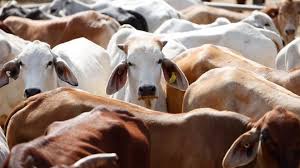IN MAY 2011, Four Corners’, A Bloody Business, opened the collective eyes of the Australian public to the horrific way in which Australian cattle ended their lives in Indonesian abattoirs.
Australians watched – shocked and distressed as footage of animals’ eyes being gouged, tails being broken and cattle being hit and kicked streamed into Australian living rooms.
Viewers witnessed cattle smash their heads repeatedly on concrete, struggle and vocalize in pain for minutes after blunt knives and inexperienced slaughtermen failed to make clean cuts to the throat.
These horrific acts of cruelty both traumatised and mobilised the nation.
Rallies were held in major capital cities of Australia, politicians’ in-boxes were flooded with emails opposing the live export trade, talkback radio was inundated with calls and MPs called for a conscience vote on the issue.
While for many Australians this story may have been their first exposure to the reality of the live export industry, concerned individuals and animal welfare organisations have been raising concerns to government and industry bodies about the inherent cruelty associated with live export for more than 30 years.
The live export industry and government would have us believe these horrific acts of animal cruelty were isolated incidents. This is not true.
One organisation opposing the live export industry is VALE (Vets Against Live Export). This group of more than 100 veterinarians has spoken out to show the reality behind live export, and expose the people who continue to let it happen despite overwhelming evidence of poor animal welfare at all stages of the live export process.
Despite repeated assurances by government and industry bodies that animal welfare standards were being met, further revelations of animal brutality were revealed in November 2012, this time to sheep exported to Pakistan.
This time, in Another Bloody Business, viewers witnessed sheep being stabbed, clubbed and buried alive in their thousands.
How much suffering must these animals endure for the sake of profit?
The live export industry does not recognise sheep and cattle as living, breathing, sentient beings capable of feeling pain and experiencing fear.
Instead they are viewed as “commodities” no different to wheat, gold, oil and natural gas. Such sentient beings are regarded as units of production in an industrial process.
It is morally reprehensible the Australian government defends large-scale animal cruelty associated with the brutal live export trade just because it pays someone’s bills.
Those who view sheep and cattle as units of production are at odds with not only large segments of the Australian population but also, arguably, God.
In 1990 the Pope stated animals “possess(ed) a soul and that men must love and feel solidarity with our smaller brethren.”
According to Nobel Prize winner John M Coetzee: “Something has gone badly wrong in relations between human beings and other animals, and it is not just animal welfare and animal rights organisations that say so. Large swathes of the public are troubled too.”

